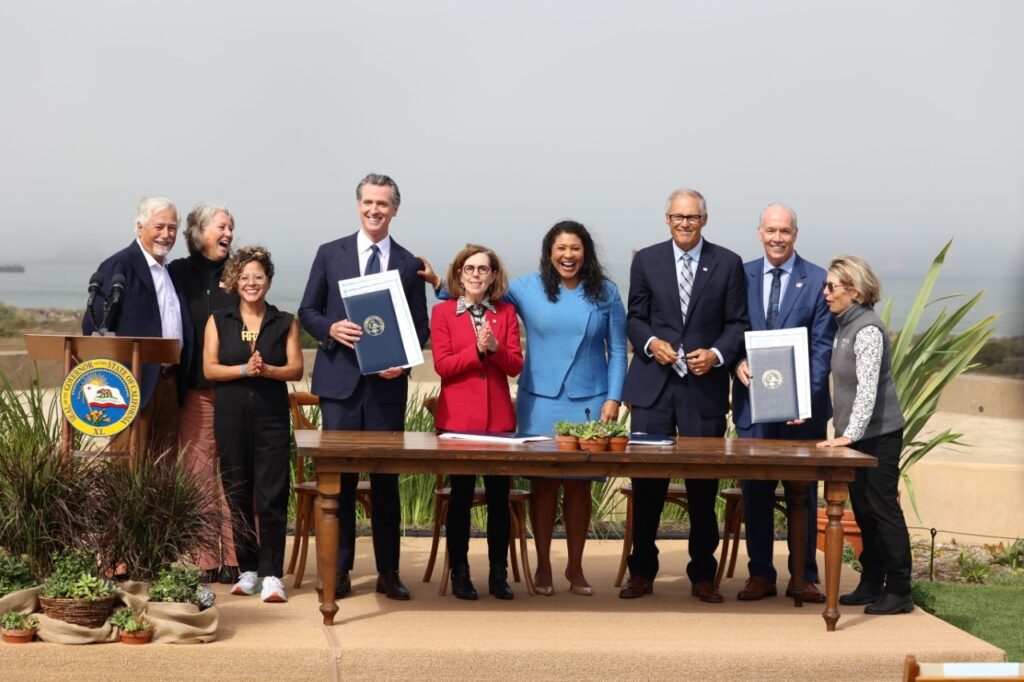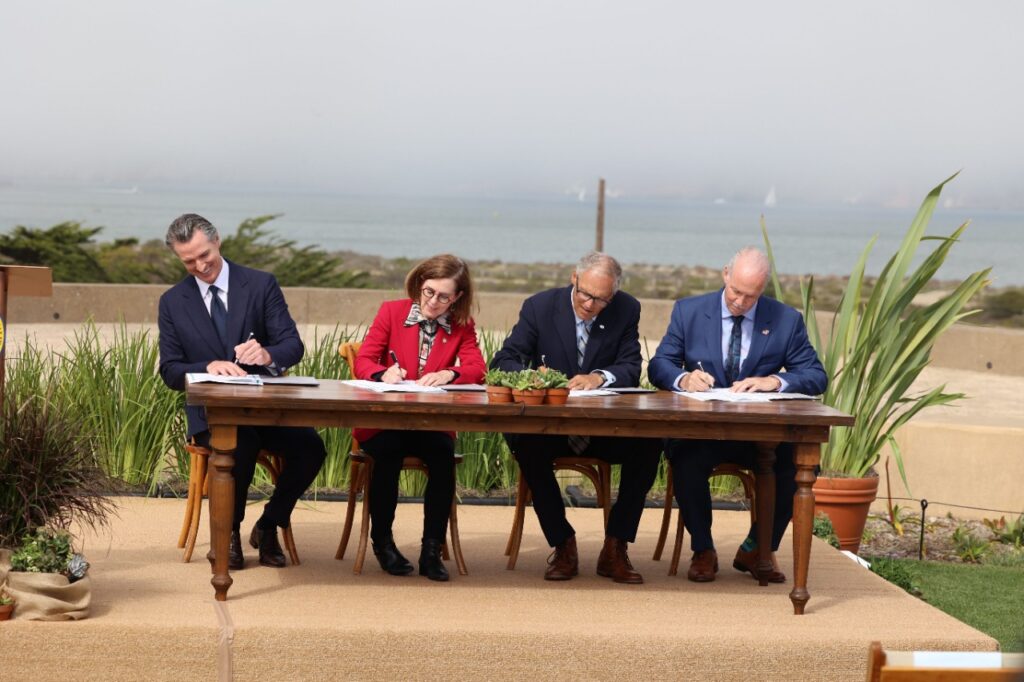
Líderes de la Costa Oeste redoblan acciones para combatir la crisis climática luego de que los gobiernos de California, Oregón, Washington y Columbia Británica ‒Canadá‒ firmaron este jueves una nueva Declaración de Cooperación ‒SOC, por sus siglas en inglés‒ que vuelve a comprometer a la región a favor del medio ambiente.
La asociación promueve la colaboración entre los cuatro gobiernos regionales para acelerar la transición hacia una economía baja en carbono, invertir en infraestructura climática como estaciones de carga de vehículos eléctricos y una red eléctrica limpia, así como proteger a las comunidades de los impactos climáticos como la sequía, los incendios forestales, las olas de calor y los cambios de nivel el mar.
El SOC incluye un enfoque principal en la equidad, asegurando que ninguna comunidad se quede atrás en la transición hacia un futuro bajo en carbono.
La alcaldesa de San Francisco, London Breed, recibió al gobernador de California, Gavin Newsom, a la gobernadora de Oregón, Kate Brown, al gobernador de Washington, Jay Inslee, y al primer ministro de la Columbia Británica, John Horgan, para la firma de la Declaración de Cooperación y Colaboración de la Costa del Pacífico en Presidio Tunnel Tops en San Francisco.

Así, los líderes de las cuatro jurisdicciones, cada uno con sus propias agendas climáticas ambiciosas, se unieron para continuar fortaleciendo los enfoques y las conexiones regionales, para ayudar a impulsar el trabajo climático esencial lo más rápido posible.
«En California, superamos nuestro peso en lo que respecta a la acción climática, pero nuestras acciones no pueden hacer mucho sin el resto del mundo a nuestro lado. La Costa del Pacífico está subiendo el listón para hacer frente a la crisis climática y, al mismo tiempo, garantizar que todas las comunidades estén incluidas en nuestros esfuerzos. Occidente continuará liderando el camino hacia un futuro libre de carbono que respalde nuestra economía, nuestra gente y nuestro planeta», dijo el gobernador Newsom.
En su momento, la gobernadora de Oregón, Kate Brown, detalló que «la costa oeste está unida a medida que lideramos el camino hacia un futuro de energía limpia que ayude a toda nuestra región y economías a prosperar».
Precisó además que, en Oregón, se han establecido metas ambiciosas para alcanzar fuentes de energía 100 por ciento limpias, reducir las emisiones de carbono y abordar el cambio climático de manera integral.
«Estamos comprometidos a abordar los impactos del cambio climático y al mismo tiempo satisfacer las necesidades de nuestras comunidades más vulnerables. Juntos, estamos demostrando que es posible abordar el cambio climático y crear empleos bien remunerados al mismo tiempo, a medida que avanzamos hacia un futuro más sólido, más limpio y equitativo», subrayó.
Para el gobernador de Washington, Jay Inslee, este nuevo acuerdo reafirma los compromisos de descarbonizar las economías «en un momento en que las consecuencias de la victoria o la derrota en este esfuerzo nunca han sido más agudas».
«Nuestras asociaciones hablan de cuán diversa e interconectada ya se ha vuelto la economía de la energía verde. Sabemos adónde va desde aquí: hacia una economía energética más limpia, más barata y más eficiente que al mismo tiempo evita la calamidad climática. Juntos invertiremos en una transición equitativa hacia un futuro más limpio, construiremos la infraestructura climática que necesitamos y protegeremos a nuestras comunidades de incendios forestales, sequías, calor e inundaciones provocados por el clima», puntualizó.
El primer ministro Horgan de la Columbia Británica en Canadá, recordó que la costa del Pacífico de América del Norte, ha estado en la primera línea de la crisis climática, experimentando sus impactos más devastadores y liderando el mundo en el desarrollo de soluciones para reducir la contaminación por carbono.
«Al firmar esta declaración de cooperación, estamos construyendo sobre nuestras fortalezas como líderes en la acción climática y posicionándonos para el éxito en una economía de energía limpia. Trabajando juntos, estamos trazando un camino hacia un futuro más limpio y sólido con buenos empleos y oportunidades para las personas en ambos lados de la frontera», destacó.
La declaración firmada este jueves incluye el apoyar una transición equitativa y justa hacia un futuro bajo en carbono y resiliente al clima, enfatizando las inversiones en comunidades sobrecargadas, así como la inversión en infraestructura climática, como estaciones de carga para vehículos eléctricos, puertos ecológicos y una red eléctrica limpia y confiable en toda la región.
Además, busca proteger a las comunidades y las tierras naturales y de trabajo de los incendios forestales, sequías, olas de calor, acidificación de los océanos e inundaciones.
La costa del Pacífico de América del Norte representa una región próspera de 57 millones de personas con un PIB combinado de 3.5 billones de dólares.
Así, a través de Pacific Coast Collaborative, Columbia Británica, Washington, Oregón, California y las ciudades de Vancouver, Seattle, Portland, San Francisco, Oakland y Los Ángeles trabajarán en conjunto para construir la economía baja en carbono del futuro y para reducir las emisiones de gases de efecto invernadero al menos en un 80 por ciento para 2050.
El mes pasado, California promulgó algunas de las medidas climáticas más agresivas de la nación en la historia cuando el gobernador Newsom firmó un amplio paquete de legislación para reducir la contaminación, proteger a los californianos de los grandes contaminadores y acelerar la transición del estado a la energía limpia, una pieza esencial del Clima de California, compromiso que marcó una inversión récord de 54 mil millones de dólares en acción climática.
Este año, California ha firmado Memorandos de Cooperación con Canadá, Nueva Zelanda y Japón, así como otros de entendimiento con China y Países Bajos para abordar la crisis climática.
El año pasado, el gobernador Newsom y 24 gobernadores de la Alianza Climática bipartidista de EE. UU. se comprometieron a lograr colectivamente cero emisiones netas de gases de efecto invernadero a más tardar en 2050.
Te puede interesar: Ahorrar agua y construir un futuro más resiliente

